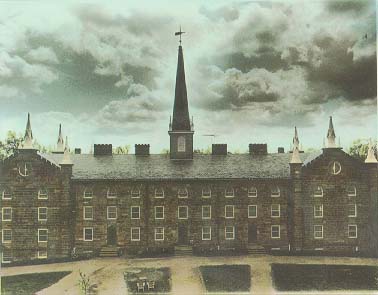|
|
|
||||
| Pre-Kenyon Life Edward Rhodes was born in Cumberland, Maryland; predominately black town of about 1000 residents. Rhodes and his three younger siblings lived with their parents, John Henry and Ella Rhodes. John worked as a mail and baggage porter while Ella was a train station matron. Cumberland, like most Southern towns, was racially segregated. Rhodes noticed that segregation became more pronounced as he grew older. Still, it was a wonderful little town with no real external threats, no ghettos. Rhodes did have a problem with the town's high school, however. He noticed that all of the males were tracked to industrial arts courses, and females were tracked into home economics courses. |
||||||
Interested in Chemistry, Rhodes knew that his academic interest would not be encouraged at Cumberland's high school. He decided that he would have to transfer if he was going to have a chance to get a competitive education that would allow him to go to college. So, during his 11th grade year, he moved in with an uncle in who lived in Washington DC and transferred to Dunbar High School, arguably the premiere black high school in the nation at the time. During his senior year of high school, Edward began to explore options for college. He decided that after being in segregated conditions most of his life, he would like to go to an integrated high school. He received a thumbnail sketch of Kenyon, along with other small liberal arts colleges in the mid-west from Negro National Scholars Board (the organization that would become the United Negro College Fund). Rhodes was intrigued by Kenyon and drove down to see the school with his father. |
||||||
 Old Kenyon |
After seeing the lush campus, Edward decided that Kenyon was the place for him. He states that there was no initiative from Kenyon to pursue him, and without his own initiative, he would not have found or even considered Kenyon. The state of Maryland did not allow black students to attend the University of Maryland, but offered scholarship to black students who wanted to study out-of-state, or a field not offered at Maryland's black colleges. Rhodes stated that he was interested in studying research Chemistry: "Now obviously there was no such thing at the undergraduate level, but it was good enough for them." Rhodes received an annual $600 scholarship towards Kenyon's $1000 tuition. Rhodes entered Kenyon in Fall 1951, and would work while at Kenyon to help earn the difference. | |||||
| Early Kenyon Life Kenyon, compared to today was a very small school in 1950. About 1/3 of its current population, Kenyon students numbered around 500 at the time, including Bexley Hall Seminary students. The school was all male and mostly Northeasterners. Edward had visited Kenyon during the summer, so he did not get a chance to see classes in session or see students on campus. Obviously, it was a much different place with the students on campus. He remembers being dropped off at "The Barracks" by his parents and siblings. They all remarked how forlorn he looked as they left. He says that he forlorn, until he met one of his roommates, Dave Hoffman, a Quaker from Pennsylvania. He and Dave became fast-friends, and Dave introduced him to some of his friends as well. Edward would go on to begin his acclimation to Kenyon. |
||||||
| Organizations/Fraternities and Sports | |||
|
|||
| His connections within the Archons ultimately led him to his campus job as a proctor in the Pool Lounge. In addition to pledging Archon his freshman year, Rhodes also played and lettered on the varsity football and lacrosse teams. He decided to stop playing football, however, in the interest of his grades. | |||
|
Rhodes #75 and Lowry #44, were among the first black students to attend Kenyon College. Both played on the varsity football team. |
Rhodes served as a proctor in the pool hall as a part-time job. |
||
| Race Related Incidents | ||
| Rhodes was very gregarious and outgoing upon entering Kenyon. He states that he had very few overtly racial incidents
at Kenyon. Along with his own personality, he attributes his acceptance to two factors: First, there were only
six or seven blacks at Kenyon during his entire four-year stay. He believes that these numbers were too small a
black population to be intimidating. Although three black students entered in his class, Rhodes was the only to
graduate in 1955. Second, he knew that racism existed, as it did everywhere, therefore he used his intuition and
personal judgment. "Yes, I encountered racism, but it was no different than was universally present in the
1950s...I wouldn't go anywhere I thought that I wouldn't be welcomed." Rhodes also had prior experience working with whites. During the summers before college, he had served as a bus boy and waited tables at a country club. His father told him that every black man should know how to wait a table, that way he would always have a job. Although Rhodes was reluctant to accept that, he knew that it was true for the time period. Even though his experience was pleasant overall, he still recalls certain racially motivated occurrences. During a lecture in a Chemistry course his freshman year, a professor, used the phrase "nigger in the wood-pile" when describing how scientist knew that there were more elements yet to be discovered. Although this offended him, he felt that there was nothing he could do that would positively benefit him, so he simply chose to ignore it. |
| Academics/Graduation | |||||
|
|||||